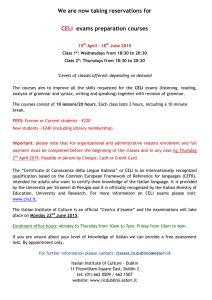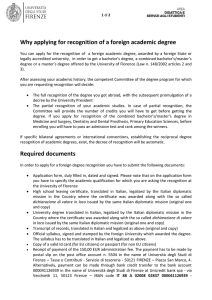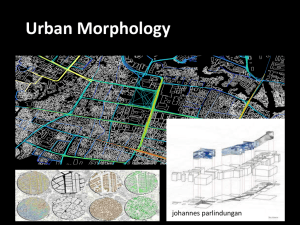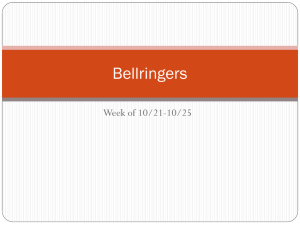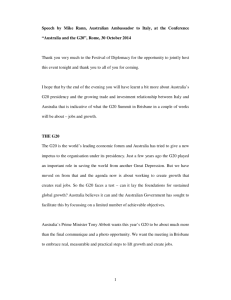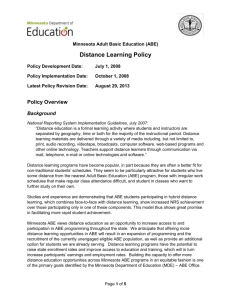Colour Me Good Cara
advertisement
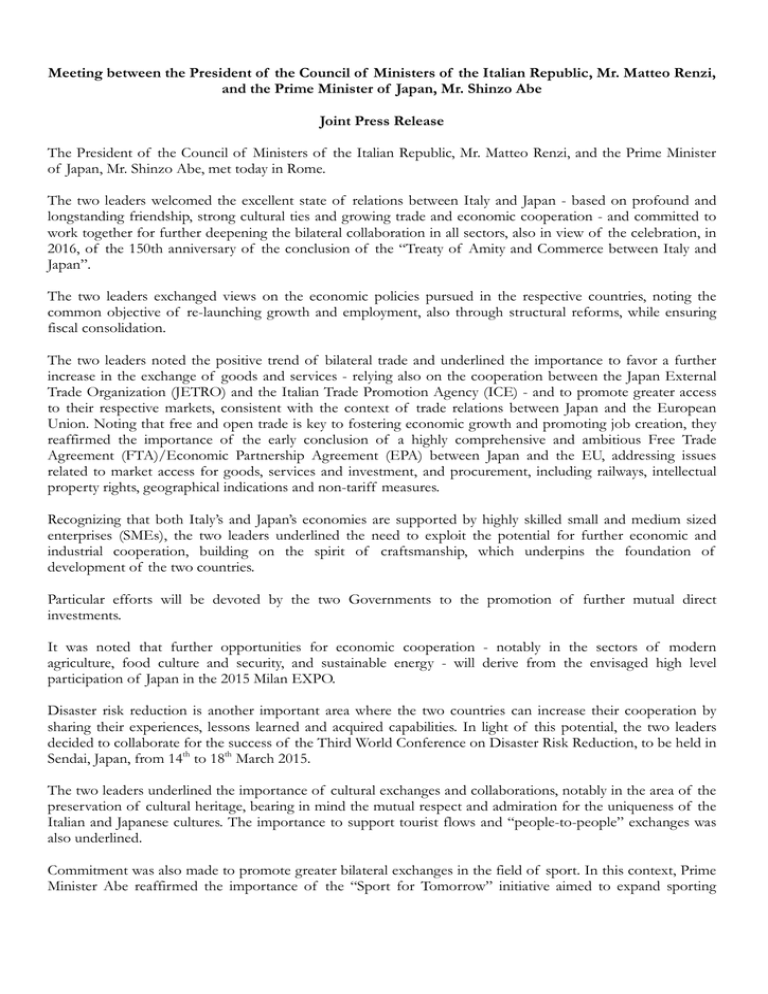
Meeting between the President of the Council of Ministers of the Italian Republic, Mr. Matteo Renzi, and the Prime Minister of Japan, Mr. Shinzo Abe Joint Press Release The President of the Council of Ministers of the Italian Republic, Mr. Matteo Renzi, and the Prime Minister of Japan, Mr. Shinzo Abe, met today in Rome. The two leaders welcomed the excellent state of relations between Italy and Japan - based on profound and longstanding friendship, strong cultural ties and growing trade and economic cooperation - and committed to work together for further deepening the bilateral collaboration in all sectors, also in view of the celebration, in 2016, of the 150th anniversary of the conclusion of the “Treaty of Amity and Commerce between Italy and Japan”. The two leaders exchanged views on the economic policies pursued in the respective countries, noting the common objective of re-launching growth and employment, also through structural reforms, while ensuring fiscal consolidation. The two leaders noted the positive trend of bilateral trade and underlined the importance to favor a further increase in the exchange of goods and services - relying also on the cooperation between the Japan External Trade Organization (JETRO) and the Italian Trade Promotion Agency (ICE) - and to promote greater access to their respective markets, consistent with the context of trade relations between Japan and the European Union. Noting that free and open trade is key to fostering economic growth and promoting job creation, they reaffirmed the importance of the early conclusion of a highly comprehensive and ambitious Free Trade Agreement (FTA)/Economic Partnership Agreement (EPA) between Japan and the EU, addressing issues related to market access for goods, services and investment, and procurement, including railways, intellectual property rights, geographical indications and non-tariff measures. Recognizing that both Italy’s and Japan’s economies are supported by highly skilled small and medium sized enterprises (SMEs), the two leaders underlined the need to exploit the potential for further economic and industrial cooperation, building on the spirit of craftsmanship, which underpins the foundation of development of the two countries. Particular efforts will be devoted by the two Governments to the promotion of further mutual direct investments. It was noted that further opportunities for economic cooperation - notably in the sectors of modern agriculture, food culture and security, and sustainable energy - will derive from the envisaged high level participation of Japan in the 2015 Milan EXPO. Disaster risk reduction is another important area where the two countries can increase their cooperation by sharing their experiences, lessons learned and acquired capabilities. In light of this potential, the two leaders decided to collaborate for the success of the Third World Conference on Disaster Risk Reduction, to be held in Sendai, Japan, from 14th to 18th March 2015. The two leaders underlined the importance of cultural exchanges and collaborations, notably in the area of the preservation of cultural heritage, bearing in mind the mutual respect and admiration for the uniqueness of the Italian and Japanese cultures. The importance to support tourist flows and “people-to-people” exchanges was also underlined. Commitment was also made to promote greater bilateral exchanges in the field of sport. In this context, Prime Minister Abe reaffirmed the importance of the “Sport for Tomorrow” initiative aimed to expand sporting values and the Olympic movement for a better future. Support was expressed by the Italian side for the preparation and success of the 2020 Olympic and Paralympic Games in Tokyo. The two leaders expressed their determination to work jointly for the further strengthening of relations between Japan and the European Union, especially during the incoming Italian Presidency of the EU. They welcomed the successful outcome of the 22nd EU-Japan Summit held in Brussels on 7th May 2014 and expressed support for the conclusion, as rapidly as possible, of an ambitious Strategic Partnership Agreement (SPA) with a comprehensive coverage between the European Union and Japan. The two leaders also decided to cooperate closely for the success of the 10th Asia-Europe Meeting (ASEM 10) to be hosted in Milan on 16-17 October 2014 - as a remarkable opportunity to boost dialogue and cooperation between the countries of Asia and Europe. It was noted that Italy and Japan - also as partners in the G7 and G20 - base their relationship on the common values of democracy, the rule of law and human rights, as well as on shared principles such as open markets and a rules-based international system. The two countries also have interests and responsibilities in addressing a broad range of international issues, on the recognition that Europe and the Asia-Pacific region are closely linked in terms of security and economically interdependent in today’s globalized world. In this connection, Prime Minister Abe explained Japan’s security policy of “Proactive Contribution to Peace” based on the principle of international cooperation. President Renzi welcomed Japan’s intention to proactively contribute to international efforts to secure peace, stability and prosperity. The two leaders exchanged views on the current situation in Ukraine in the aftermath of the G7 Summit. With regard to the situation in East and South East Asia, they emphasized the importance of maintaining regional peace, security, and stability by addressing international disputes peacefully, through dialogue and negotiations, and in accordance with the principles of international law. They also concurred on the need to continue to ensure the freedom of navigation and overflight of the high seas as enshrined in the United Nations Convention on the Law of the Sea (UNCLOS). With reference to the Korean Peninsula, they underlined the need for North Korea to fully comply with its obligations under relevant United Nations Security Council Resolutions and with commitments under the 2005 Six-Party Talks Joint Statement. They also concurred that North Korea should take immediate steps to end human rights violations, including the abductions issue. The two leaders reiterated the importance of ensuring safety of navigation and the commitment of the two countries to combat piracy and other maritime crimes, consistent with international law and internationally recognized principles of jurisdiction in international waters. They also reaffirmed the determination of the two countries to contribute to the international fight against transnational organized crime. Reflecting the increased level of bilateral cooperation in the field of security and defense, the two leaders decided to work towards an early conclusion of the agreement on the security of information, to start talks on possible cooperation in the defense equipment and technology and to enhance crisis management cooperation. The two leaders exchanged opinions on the current agendas of the G7 and G20 activities in light of the results of the G7 Summit held in Brussels on 4th and 5th June and in view of the G20 Summit to be held in Brisbane on 15th and 16th November. Rome, the sixth of June 2014





